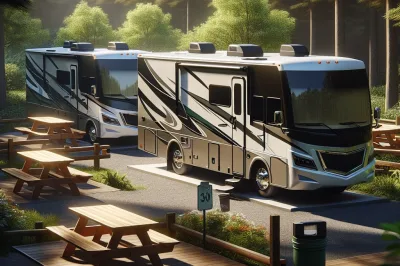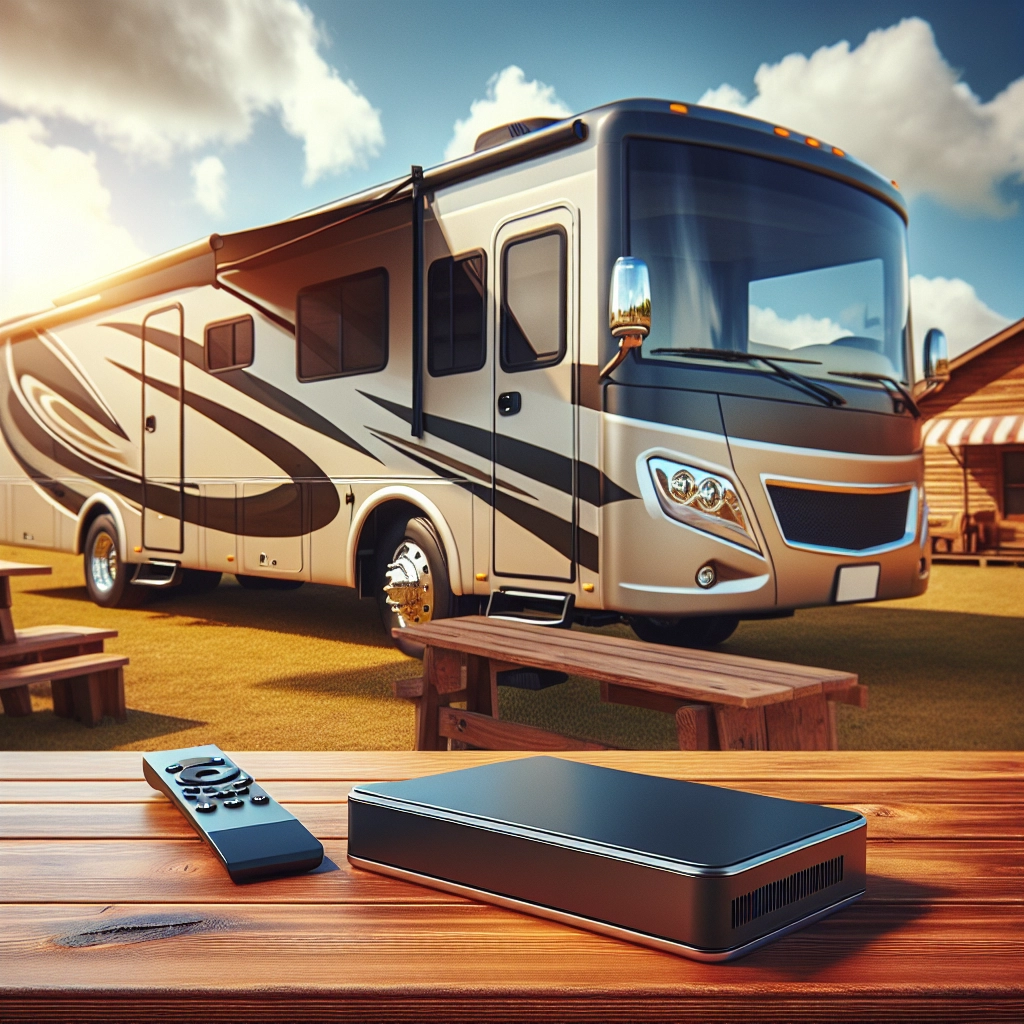Table of Contents

When you’re living the RV life, freedom is your compass, and the open road is your map. But to keep that sense of adventure alive, your RV’s solar batteries need to be in top-notch condition. Just like your RV needs regular oil changes and tire rotations, your solar batteries require consistent care to ensure they’re always ready to fuel your journey.
Revitalize Your Journey: Mastering RV Solar Battery Care
Let’s embark on a journey to master the art of RV solar battery maintenance. It’s not just about keeping the lights on; it’s about sustaining the freedom of your nomadic lifestyle. Proper care of your solar batteries means less downtime, fewer expenses, and more time enjoying the great outdoors.
Key Takeaways: Essential Maintenance Insights
- Regular battery inspections can prevent costly repairs and extend battery life.
- Understanding voltage readings is crucial for assessing battery health.
- Clean solar panels are more efficient and lead to better battery performance.
- Protecting your batteries from extreme temperatures will enhance their longevity.
- Efficient energy usage is key to maximizing your solar power system’s potential.
Why Your RV’s Solar Battery Health Matters
Think of your RV’s solar battery as the heart of your off-grid power system. A healthy battery means a reliable source of power for all your needs, from the morning coffee to the evening lights. Neglecting battery health can lead to power interruptions, unexpected costs, and the hassle of premature replacements.
Assessing Your Solar Battery’s Condition
Before we get our hands dirty, it’s essential to assess the current state of your solar batteries. This step helps you understand what maintenance is needed and when it’s time to consider a replacement. A well-maintained battery can last several years, but only if you give it the attention it deserves.
Visual Inspections: What to Look For
Start with a visual inspection of your batteries. Look for any obvious signs of wear and tear, such as corrosion on the terminals, cracks in the casing, or bulging sides. These can all be indicators of deeper issues. Keeping an eye out for these signs can catch problems before they escalate.
Understanding Battery Voltage Readings
Next, grab your multimeter and check the voltage. A fully charged 12-volt battery should read around 12.6 to 12.8 volts. If your readings are consistently lower, it’s a sign that your battery may not be charging fully or that it’s starting to lose its ability to hold a charge.

Regular Maintenance Routines to Keep Batteries Thriving
A stitch in time saves nine, and this couldn’t be truer for maintaining your RV’s solar batteries. Regular check-ups and a bit of TLC can prevent the majority of battery issues. Make it a habit to check your battery at least once a month. Ensure the connections are tight and corrosion-free, and the battery fluid levels are adequate if you’re using lead-acid batteries. For those with sealed batteries, check for any signs of swelling or damage.
Cleaning Tips for Optimum Solar Panel Performance
Your solar panels are the lifeline to your batteries. Keeping them clean ensures they’re working efficiently. Here’s how to keep them sparkling:
- Use a soft brush or cloth to remove loose dirt and debris.
- Wipe the surface with a damp cloth to remove any remaining grime.
- For stubborn dirt, use a mild, non-abrasive cleaner.
- Clean your panels during the cooler parts of the day to prevent rapid drying which can leave streaks.
- Regularly trim any overhanging branches that may drop sap or leaves onto the panels.
Clean panels mean more sunlight gets converted to energy, keeping your batteries charged and ready to go.
Ensuring Proper Battery Charging Practices
Charging your batteries correctly is just as important as keeping them clean. Overcharging can reduce a battery’s lifespan, while undercharging can leave you without power when you need it most. Here’s what you should do:
- Use a charge controller to prevent overcharging and undercharging.
- Follow the manufacturer’s guidelines for charging cycles.
- Charge your batteries fully at least once a month to prevent sulfation.
- Never let your batteries deplete completely; aim to recharge when they hit 50% capacity.
Proper charging habits ensure your batteries have a long and productive life.
Preventative Approaches to Solar Battery Care
Prevention is always better than cure, especially when it comes to battery maintenance. Here are some preventative measures you can take to ensure your batteries remain in peak condition:
Protecting Batteries from Extreme Temperatures
Extreme temperatures can wreak havoc on your batteries. In the heat, they can overcharge and degrade faster. In the cold, their capacity to hold a charge can diminish. To protect your batteries:
- Insulate your battery compartment to keep it cool in summer and warm in winter.
- Avoid parking your RV in direct sunlight for extended periods.
- In cold climates, consider a battery heater to maintain an optimal temperature.
Temperature control is a simple yet effective way to extend your battery’s life.
The Role of Ventilation in Battery Health
Ventilation is crucial, especially for lead-acid batteries that release gases during charging. A well-ventilated battery compartment allows these gases to escape, which prevents buildup and potential damage. Make sure your battery area has adequate airflow, and check the vents to ensure they’re clear of obstructions.
With these maintenance routines in place, your RV’s solar batteries will be ready to power your adventures for years to come. Remember, consistent care is the key to a reliable and efficient solar power system.

Extending Battery Life: Efficient Usage Techniques
Getting the most out of your RV’s solar batteries isn’t just about maintenance—it’s also about how you use them. Efficient usage can significantly extend the life of your batteries, ensuring that they keep you powered up for all your adventures. Let’s explore some techniques that can help you use your batteries more efficiently.
Energy Conservation Strategies on the Road
Conserving energy is a surefire way to extend the life of your solar batteries. Here are some simple yet effective strategies:
- Switch to LED lighting, which uses a fraction of the power compared to traditional bulbs.
- Unplug appliances when they’re not in use to avoid phantom power draw.
- Use natural ventilation instead of air conditioning whenever possible.
- Cook outside on a grill to keep heat out of the RV and reduce the need for the AC.
- Monitor your energy usage with a solar power monitor to identify areas where you can save.
By adopting these habits, you’ll not only save energy but also reduce the strain on your batteries, giving them a longer, healthier life.
Upgrading to Battery-Friendly Appliances
Another way to ensure efficient battery usage is by choosing the right appliances. Upgrading to energy-efficient models can make a big difference. Look for appliances with a low power draw and a high energy efficiency rating. Consider investing in:
- Energy Star-rated refrigerators that keep your food cold without draining your batteries.
- Convection ovens that cook more quickly and evenly, using less energy than conventional ovens.
- Portable solar chargers for small devices like phones and tablets.
- High-efficiency water heaters that provide hot showers without a huge power hit.
These upgrades can help you make the most of your solar power, reducing the need for frequent recharging and prolonging battery life.
Seasonal Solar Battery Maintenance
Just like your RV needs different care in the summer and winter, your solar batteries also require seasonal maintenance. By adjusting your maintenance routine with the seasons, you can help your batteries perform at their best year-round.
Prepping Your Batteries for Winter Storage
When winter rolls around, and you’re not using your RV as often, it’s important to prepare your batteries for storage. Here’s what you should do:
- Fully charge your batteries before storing to prevent freezing.
- Disconnect the batteries to prevent discharge from any parasitic loads.
- Store your batteries in a cool, dry place to avoid damage from freezing temperatures.
- Check the charge periodically throughout the winter and recharge if necessary.
Taking these steps will ensure that your batteries are ready to go when you are, come springtime.
Summer Strategies: Staying Cool and Charged
In the summer, heat can be a battery’s worst enemy. To keep your batteries cool and efficiently charged during the hotter months, follow these tips:
- Park in the shade to keep your RV and batteries cooler.
- Use a reflective windshield cover to reduce solar gain inside the RV.
- Ensure your battery compartment has good ventilation to dissipate heat.
- Adjust your solar panel angle to capture the most sunlight during the day.
- Keep an eye on battery temperature sensors, if available, and take action if they indicate overheating.
By keeping your batteries cool, you’ll maximize their efficiency and lifespan, even in the heat of summer.
Understanding Depth of Discharge and its Impact
Depth of Discharge (DoD) refers to how much of your battery’s capacity has been used. For instance, if your battery is at 50% capacity, it has a DoD of 50%. It’s crucial to understand that the deeper the discharge, the shorter the battery’s lifespan. To keep your batteries healthy:
- Avoid discharging your battery completely; aim to keep the DoD under 50%.
- Regularly monitor your battery’s state of charge to prevent deep discharges.
- Consider using more batteries in parallel to reduce the DoD on each one.
By managing the DoD effectively, you’ll ensure your batteries last longer and perform better over time.
Battery Equalization: What It Is and When to Do It
Battery equalization is a controlled overcharge performed on flooded lead-acid batteries to balance the electrolyte levels within each cell. It helps remove sulfate crystals that build up on the plates over time. Here’s how to equalize your batteries:
- Read your battery manufacturer’s instructions carefully before starting.
- Only perform equalization on batteries that are designed for it and when they show signs of needing it, such as unequal cell voltages or reduced capacity.
- Typically, equalization should be done every 6 to 12 months, depending on usage.
Remember, safety first: wear protective gear and ensure good ventilation during the equalization process.

Dealing With Common Battery Maintenance Setbacks
Even with the best maintenance routine, you may encounter setbacks. Knowing how to handle these can save you time and money, and keep you on the road to adventure.
Troubleshooting Reduced Battery Capacity
If you notice your batteries aren’t holding a charge as they used to, here’s what to do:
- Check for and clean any corrosion on battery terminals and connections.
- Ensure your batteries are being charged properly with a multimeter.
- Test individual cells with a hydrometer to check for specific gravity differences.
- Adjust your usage habits to prevent deep discharges.
If these steps don’t improve capacity, it may be time to consider replacing your batteries.
When to Seek Professional Help
While many maintenance tasks can be done on your own, there are times when it’s best to seek professional help. If you’re experiencing:
- Consistent underperformance despite following maintenance protocols.
- Physical damage to the battery that you’re not equipped to handle.
- Repeated electrical issues that could indicate a more complex problem.
Don’t hesitate to consult a professional. They can provide the expertise needed to diagnose and fix the issue safely and effectively.
Frequently Asked Questions (FAQ)
Is It Necessary to Disconnect My Solar Batteries When Not in Use? Maintenance Checks on My RV Solar Battery?
Disconnecting your solar batteries when not in use can prevent energy leaks and prolong their lifespan. This is especially important during storage periods, as even the smallest drain over time can significantly deplete your battery’s charge. Remember to fully charge your batteries before disconnecting them to maintain their health while they’re not in use.
What Should I Do If My Battery Isn’t Holding a Charge?
If you find your battery isn’t holding a charge, first ensure it’s not a simple issue like a loose connection or corrosion on the terminals. If everything looks good externally, test the battery with a multimeter. Should the battery still struggle, consider a controlled overcharge or ‘equalization’ if it’s a lead-acid type. If these steps don’t resolve the issue, it might be time for a professional assessment or a battery replacement.
Can I Use Regular Car Batteries for My RV Solar Setup?
While it might be tempting to use a regular car battery for your RV solar setup, it’s not the best choice. Car batteries are designed for short bursts of high power to start an engine, not for the prolonged and deep discharges associated with solar systems. Instead, opt for deep-cycle batteries that are built to handle the demands of your RV’s solar power needs.
How Often Should I Perform Maintenance Checks on My RV Solar Battery?
For a smooth and uninterrupted RV experience, regular maintenance checks on your solar battery are essential. A visual check once a month is a good practice, while a more comprehensive review every six months can catch issues before they become serious problems. If you’re a full-time RVer, consider checking more frequently due to the constant use of your system.
What’s the Best Way to Monitor My RV Solar Battery Health?
Use a multimeter to check voltage and a hydrometer for specific gravity in flooded batteries. For a more hands-off approach, consider installing a battery monitor that provides real-time data.
In conclusion, maintaining your RV’s solar batteries is not just about preserving their lifespan; it’s about ensuring the freedom and joy of your RV lifestyle. By performing regular checks, using the right type of batteries, addressing charging issues promptly, disconnecting during periods of inactivity, and monitoring health with the right tools, you can enjoy the peace of mind that comes with a reliable power source.
So, take the time to care for your batteries, and they’ll take care of you on your travels, allowing you to focus on making memories that will last a lifetime.
- Boondocking RVs: Flexible Solar Solutions – 3 March 2024
- Renewable Energy Tips for Full-Time Boondocking RVers – 2 March 2024
- Boondocking Solar Power Systems: Sizing Options & Solutions for Motorhomes – 1 March 2024
